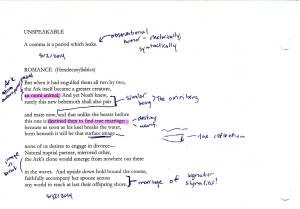“Unspeakable”
Well, this one line poem is more of a craft and visual play. Visual because, yes, the comma does indeed look like a period which leaks “,” but also there are some situations in which the sentence should end with a period, but a comma keeps the idea and the momentum moving — a leak of sorts (see this sentence as an example).
“Romance (Hendecasyllabic)”
My knowledge of form is not that strong, hence, wikipedia link to Hendecasyllabics. I tried to scan the poem based on long and short syllables and I’m pretty horrible at it (everything came up as short syllables “u” which I’m pretty sure is not right). However, the eleven syllables are there.
Why? To emulate Frost, Catullus, or Swinburne? Not sure. Probably there isn’t an answer, but the poem does announce its form in the title.
Anyway, the poem starts out with with “Romance” as the object in which “But when it had engulfed them two by two, / The Ark itself became a greater creature,” Yes, I know the “two by two” can be a reference to animals, but what “Romance” in the title does is paint any coupled situation in the poem in its direction. “an omni animal. And yet Noah knew, / surely this new behemoth shall also pair / and mate now,”
The forced coupling, or the divine knowledge that everything should be a couple. In either case the ideal becomes more explained through the persona of Noah:
[…] and that unlike the beasts before
this one is destined then to find true marriage,
because as soon as he keel breaks the water,
born beneath it will be that surface image.
What’s brought to light is the reflection of the ark in the water which not only is a mimicked pair, but a pair that can’t leave if there’s always water surrounding the boat. “none of us desires to engage in divorce– / Natural nuptial partner, mirrored other,” Here is the key line that passes from persona play to something more. These lines is more of a commentary of having another.
“none of us desires to engage in divorce” seems like a long line, but there’s the play in ideas through language — engage and divorce; furthermore the word “Natural” has more weight in this poem than “The Ark” since everything coupled is simulated. The speaker betrays the persona only a little bit here to bring insight.
But then we’re back, “the Ark’s clone would emerge from nowhere out there / in the waves. ” As I stated before, an object surrounded by a reflection. But then, “And upside down hold bound the course, / faithfully accompany her spouse across / any world to reach at last their offspring shore.”
The poem is saved from sentimentality because the re-engagement of the persona. It is the persona that is “faithful” and it is the personal that would travel with a spouse (regardless of fabrication) to “their offspring shore.”
